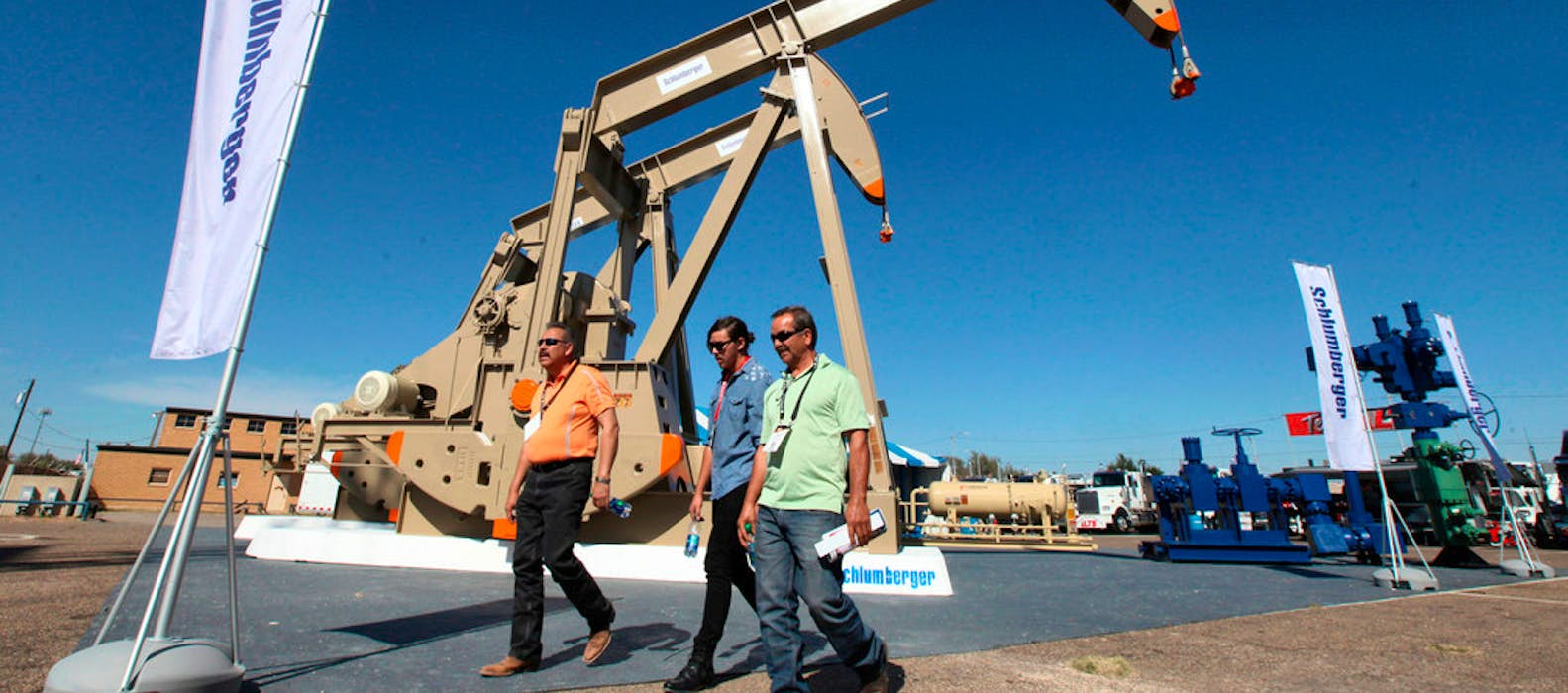Probably obama's greatest accomplishment. I still want the US removed from the global oil infastructure, as I view it as an issue of national security, and think we should get the benefits of the risks of fracking, but I was wrong to oppose fracking. Energy is too key to pretend it was an option not to do it.
Obama sure walked the fine line between Environment and Energy Independence a hell lot better than Trudeau. Then again, Green loons have very little political powers in the U.S compares to Canada, so they couldn't do shit in their attempt to kill off fracking here, whereas Ottawa can't even build a pipeline to transport their own national commodity to tidewater.
Oldie but goodie:
Obama's split personality on oil
The president infuriates greens, baffles industry.
By
DARREN GOODE | 01/29/2015
When it comes to oil, President Barack Obama wants to have it both ways.
He’s enjoying the political benefits of $2 a gallon gas, yet he’s pushing an executive action to seal off 12 million acres of Arctic land from drilling. He’s in a showdown with Republicans over the Keystone XL pipeline, yet just this week he proposed opening a huge swath of the Atlantic coast to oil exploration.
A record boom in U.S. oil production is happening under his watch, yet he’s negotiating major climate treaties that could cement his reputation as the most pro-environmental president in history.
Obama’s approach has infuriated greens, baffled the oil industry, and confused Republicans who find themselves praising him and condemning him on energy policy — sometimes within the same week. Critics on the right say Obama shouldn’t get credit for the oil gusher, and critics on the left say his environmental record is still incomplete.
“It’s like he inherited a farm that he really didn’t want right at harvest time,” said Jim Noe, an executive at oil and gas driller Hercules Offshore.
Obama’s supporters insist he’s taken a pragmatic stance on oil and gas, a balancing act seen this week when the administration proposed fencing off vast areas of Alaska and sensitive offshore areas while proposing to open waters off the Southeast coast to energy companies for the first time early in the next decade.
But that middle path has often infuriated his green supporters, and kept issues like Keystone at the center of Washington political battles over climate change and energy development as the White House avoids issuing a final verdict.
“The Obama administration has done more than any other to tackle the climate crisis,” said Glen Besa, director of the Sierra Club’s Virginia chapter. “However, these efforts must extend to keeping dirty fuels in the ground, especially in undeveloped and environmentally fragile areas like those off Virginia’s beaches.”
Those compromises are driven by the oil industry’s success in reversing the decades-long decline in U.S. production and setting loose a shale field boom that’s added more than 3 million barrels per day of new oil in the past three years, a figure greater than Venezuela’s total output.
“We had no idea what impact shale development was going to have on our domestic energy picture,” said Heather Zichal, a former top Obama energy and climate adviser. “You’re going to have to adjust your goals and ambitions based on the changing facts on the ground. We had a life-changing event from an energy perspective.”
To be sure, wind and solar power has benefited from billions of dollars in stimulus from the Obama administration, but those impacts pale when compared with the fallout from the jump in U.S. oil output.
The steep drop in oil prices has helped lop $1.30 off the price of a gallon of gasoline since last summer, effectively providing a $14 billion stimulus for consumers last year, according to American Automobile Association data. And this year, AAA predicts U.S. drivers could save $75 billion on gasoline costs compared with 2014.
And that’s helped shrink U.S. oil imports by a quarter since their peak in 2005, a trend that’s reduced U.S. dependence on supplies from the volatile Middle East and caused pain for unfriendly governments in Moscow, Tehran and Caracas.
“The conclusion seems to be that the Obama administration has reluctantly accepted supply adequacy but is wrestling with how to reconcile it with its green agenda,” said Kevin Book, an analyst at ClearView Energy Partners in Washington.
That green agenda — ranging from fuel efficiency increases for vehicles and tighter methane pollution rules for new oil and gas wells, to upcoming regulations for the oil trains, and restrictions on hydraulic fracturing on federal lands — risks being undermined by the growing output of both oil and natural gas.
“So I think this is why the president has been so schizophrenic,” said Charles Ebinger, a senior energy security and climate fellow at the Brookings Institution.
Oil industry and Republican critics bristle when Obama hails the burgeoning oil and gas output, and they say he has done little to contribute to it.
“He may want to have it both ways, but there’s a huge disproportion between what he’s taking … versus the small amount he’s putting in,” said Sen. John Barrasso (R-Wyo.).
From the outset, Obama’s first energy secretary, Steven Chu, a Nobel Prize-winning physicist and head of the Lawrence Berkeley National Laboratory, was an outspoken advocate of the need to transition away from fossil fuels to mitigate climate change.
“And the transformational agenda got transformed,” Book said, resulting in a “give a little, take a little energy policy.”
That’s led the administration to engage in some contortions on energy policy.
After including billions in support for renewable energy in his 2009 economic stimulus package, Obama proposed in early 2010 opening some areas off the Virginia coast for oil exploration as part of a deal to help win support for legislation that would have created a carbon trading regime sought by environmental groups.
Obama went to bat for the oil industry, telling a town hall event that offshore drilling was safe. “It turns out, by the way, that oil rigs today generally don’t cause spills. They are technologically very advanced,” he said at the April 2, 2010, event.
Just 18 days later, BP’s Macondo well in the Gulf of Mexico suffered a massive blowout, causing the largest spill in U.S. maritime history and prompting Obama to institute a moratorium on new deep-water drilling so the administration could beef up its industry oversight. And that quashed the Atlantic drilling initiative as well as the bill on carbon cap and trade.
That Gulf drilling moratorium lasted for six months and sparked an outcry from Republicans and the oil industry that Obama had overreacted, and permanently soured many in the industry on the president’s energy policies.
But in its draft five-year drilling plan covering 2017-2022 that was released Tuesday, the Interior Department went even further than it had in the 2010 plan, calling for a possible opening of federal waters of the coast running from Virginia to Georgia.
At the same time, Interior also proposed closing areas in the waters off Alaska — just two days after Obama proposed declaring 12 million acres of the state’s Arctic National Wildlife Reserve permanently off limits to oil and gas drilling.
Those moves got a lukewarm response from oil industry allies, who called for more areas to be opened up.
“But in policy terms, the president has generally been pro-oil-and-gas development, largely on energy security, consumer benefit, and economic grounds, opening the Gulf of Mexico to new leasing quickly after the BP spill and now the [offshore areas] along with other public lands,” said Paul Bledsoe, a senior fellow on energy at the German Marshall Fund and former Clinton White House climate official.
“His approach might be characterized as shrewd politically while realistic in policy terms, and far more centrist than his right-wing critics pretend or some liberal allies would like,” he added.
Those Interior moves followed proposals earlier in January for the first-ever Environmental Protection Agency regulations on methane pollution from new oil and gas operations. The rules were quietly welcomed by many in the energy industry, but EPA left green groups disappointed by recommending only voluntary measures that would let industry decide whether to reduce those greenhouse gas leaks from the existing network of wells, pipes and processing plants.
“The decisions seem to be sporadic and contradictory,” said Robbie Diamond, president and CEO of the nonprofit Securing America’s Future Energy, which advocates more domestic oil production. “There’s a group of decisions where environmentalists might be unhappy one day, the industry might be unhappy the next day. There’s no rhyme or reason.”
Obama’s defenders say he isn’t keeping a scorecard of which groups he is placating or offending and that he is at times the target of heightened partisanship on both wings.
“He’s not the kind of president tomorrow who is going to be talking about how we’re going to be fossil free in 10 years. He’s far more pragmatic than that,” Zichal said.
Obama has identified action on climate change as the key element of his legacy, and supporters say his executive actions and upcoming EPA rules to establish carbon dioxide limits for the electricity sector have helped jump-start the international effort to reach a global climate change deal at the end of the year.
“The president did change energy — look at all of the wind and solar we are producing today,” Zichal said, adding that the U.S. is on track to hit a 2020 greenhouse gas emission goal despite no help by Congress.
“That simply wouldn’t be the case without aggressive action by the administration on fuel economy, power plants, renewables, methane and so on,” Zichal said.
And many greens admit that Obama’s record on the environment is solid, particularly given the gridlock in Washington.
“We have to remember the constraints of the political environment that the president is operating in, and given that reality, he’s been an absolute leader when it comes to taking action on climate change,” said Alex Taurel, deputy legislative director at the League of Conservation Voters.
https://www.politico.com/story/2015/01/obama-oil-politics-114703





